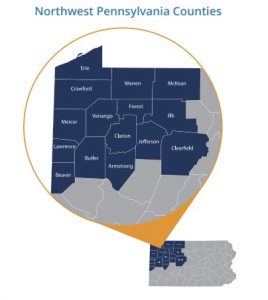Student Veterans, Mental Health and Academic Performance

The Northwest Pennsylvania (NW PA) Veteran Suicide Prevention Program operates on a three-pronged approach involving healthcare providers, community organizations, and Veterans and their families in the 15 counties of NW PA. This article summarizes a research presentation by Lee Wagner, Senior Program Implementation Specialist, and graduate student assistant Samantha Hernandez, and explores the following topics:
- Stressors associated with student Veteran experiences
- The role of Veteran transition services and community
- Gratitude as a protective factor
Read time: 7 minutes
A pdf of the presentation, including sources, is available for download.
Is Gratitude Associated with Suicidal Ideation in Student Veterans with PTSD Symptoms?
 Published in January 2022 in the Journal of Nervous and Mental Disease, this research article aimed to identify the effect of gratitude as an adaptive regulating mechanism for suicidal ideation (SI) for student Veterans with posttraumatic stress disorder (PTSD) symptoms.
Published in January 2022 in the Journal of Nervous and Mental Disease, this research article aimed to identify the effect of gratitude as an adaptive regulating mechanism for suicidal ideation (SI) for student Veterans with posttraumatic stress disorder (PTSD) symptoms.
The research was conducted through a survey shared with the student Veteran office at the University of Texas at El Paso (UTEP). The survey was distributed via e-mail and social media to student Veterans over 18 enrolled at UTEP. Questions focused on SI, depression, and gratitude. Of the respondents, 232 disclosed PTSD symptoms.
Stressors Among Student Veterans
 A literature review identified several stressors among student Veterans that negatively affect their mental wellbeing and academic performance.
A literature review identified several stressors among student Veterans that negatively affect their mental wellbeing and academic performance.
- Lack of support and understanding due to undiagnosed depression
- Family issues
- Physical health difficulties (e.g., disabilities)
- Discomfort on campus (i.e., feelings of being judged/not fitting in)
- Feelings of burdensomeness and hopelessness brought by mental health conditions and symptoms
The Role of Transition and Community
 In addition, a literature review also identified protective factors and services that positively affect mental wellbeing and academic performance.
In addition, a literature review also identified protective factors and services that positively affect mental wellbeing and academic performance.
- Peer mentorship programs
- A sense of belonging
- Culturally sensitive programming
- Gatekeeper training for campus faculty/staff and students who frequently interact with student Veterans
- Removing stigma surrounding mental health challenges
The Role of Gratitude
 Gratitude is considered an active, intentional practice of noticing and appreciating the positive aspects of life. Gratitude was assessed in study participants using the Gratitude Questionnaire which is a 6-item scale that measures an individual’s level of gratitude. Respondents answered questions about the role of gratitude in their lives, how they incorporated gratitude into daily life, and what benefits it provided for mental wellbeing and academic performance.
Gratitude is considered an active, intentional practice of noticing and appreciating the positive aspects of life. Gratitude was assessed in study participants using the Gratitude Questionnaire which is a 6-item scale that measures an individual’s level of gratitude. Respondents answered questions about the role of gratitude in their lives, how they incorporated gratitude into daily life, and what benefits it provided for mental wellbeing and academic performance.
Examples of common gratitude practices and interventions include:
- Keeping a gratitude diary
- Listing things one feels grateful for
- An in-person gratitude visit
- Writing a letter and sending it to someone who they feel grateful for
- Guided gratitude reflection
- Focusing on one thing they feel grateful for
Research Findings and Limitations
As a result of the survey analysis, key findings and limitations were identified. These included:
- SI was negatively associated with gratitude scores
- Gratitude was not associated with depression scores
- Used a single item to measure SI
- The sample consisted of those with self-reported mental illnesses and PTSD symptoms
Looking to Get Involved?
Whether you identify as a healthcare provider, community organization, or Veteran, there are several opportunities through the NW PA Veteran Suicide Prevention Program and PERU to connect to resources, participate in educational training, and promote harm reduction strategies. We are actively recruiting healthcare and community partners to work with us in meeting our goals and objectives. To learn more, visit the program website at theresilientveteran.org.
Need Help? Know Someone Who Does? Contact the National Suicide Prevention Lifeline at 1-800-273-TALK (1-800-273-8255) or use the online Lifeline Crisis Chat. Both are free and confidential. You’ll be connected to a skilled, trained counselor in your area.

